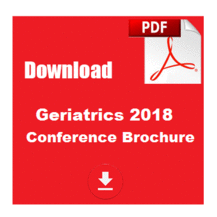
Joana F Alegria Pereira
University of Évora, Portugal
Title: The relationship between depression and violence risk predictors on elderly
Biography
Biography: Joana F Alegria Pereira
Abstract
The risk of violence on the elderly increases according to the impact of intrinsic predictors (physical, psychological, emotional and social isolation) and extrinsic to the elderly (stress and social isolation of the caregiver, financial problems, drugs, alcohol, mental health, ageism and lack of compliance with the rights of the elderly). The purpose of this study was to understand the correlation between the elderly with depressive symptomatology and the predictors of the risk of violence against them. The method used was a quantitative approach using the Statistical Package program for Social Sciences (IBM-SPSS). There was a participation of 237 elderly people aged 65-96 years, of the project “Aging in Safety in Alentejo - Understanding to Act”, at the University of Évora. The Geriatric Depression Scale (GDS 15, brief version, Yesavage et al., 1983) and the Predictors of Risk of Violence (E-IOA and VASS adaptation) were applied. About the results, 50 elderly (21.1%) had mild depressive symptomatology, and 14 (5.9%) had severe depressive symptomatology. Of the 64 elderly individuals who presented depressive symptomatology 55 were female. In the relationship between the severity of depressive symptomatology and predictors of risk of violence, significant results were found in three dimensions: Current supports and relationships, family context and cognitive / emotional difficulties. The main conclusion of the study is the relationship between depression and risk of violence in the elderly without social support networks, with complex family context and with cognitive and emotional changes. These factors contribute to greater physical and mental vulnerability of the elderly, resulting in cases of anxiety and stress, which present a depressive symptomatology and the risk of violence.

